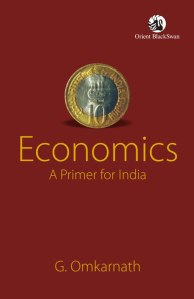Professor Jayati Ghosh of the Centre for Economics Studies and Planning (CESP) of the Jawaharlal Nehru University has been very appreciative of the new book by our colleague G. Omkarnath of the School of Economics (as well as the Centre for the Study of Social Exclusion and Inclusive Policy), Economics: A Primer for India, recently brought out by Orient Blackswan. In a review in Frontline she says: This book should be required reading not just for the average person who wants to know more about how the economy and economic policies affects her own life, but also for media persons, government officials and legislators who determine economic policy, and even those regularly engaged in pursuing the profession in different ways. This may be a sad commentary on the state of public knowledge about economics. But the unfortunate truth of that statement shows how important it is for books like this one to have very wide readership and dissemination.
The fact of the matter is that there are few books that are written with sufficiently clarity in most fields, and especially on matters in the social sciences, where examples and instances from a local context can make the immediate connection. Prof. Omkarnath’s book is therefore quite unusual. The review has this more to say: … a new book by G. Omkarnath, Economics: A Primer for India (Orient Blackswan, Hyderabad, 2012) comes as a welcome addition. It is usually an act of great courage to write an introductory book on anything, and it is probably even more courageous to do so for a subject like economics. This book is nothing if not ambitious: it attempts “to bridge the gulf between the real world and introductory economics”, by introducing the subject through the medium of the Indian economy.
Given the grand nature of this task, the author has done a surprisingly good job, presenting the basic ideas of the economic structure of society and of change through time in a logical, clear and consistent manner. Omkarnath concisely discusses issues of production, distribution and growth; of market functioning and how it can be socially embedded; of the significance of macroeconomic variables like savings and investment and how they are measured; of various government policies and their effects on economies, including both state intervention and liberalization; of the challenges of economic diversification and industrialization in affecting both productive structures and employment; of the significance of petty production as well as the persistence of informality; and other issues directly relevant to the Indian economy.
There was a formal release at the University a few weeks ago, in collaboration with the publishers, Orient Blackswan. As the blurb on their website says, “Economics: A Primer for India is tailor-made for foundation courses in undergraduate programmes. Its pedagogic standpoint is based on two convictions. First, a foundation course need not invoke formal economic theory which is a contested terrain, especially at the present time. Second, such a course should be grounded on the empirical reality of the economy in which students live.
Context. As I remarked in an earlier post, some things are better taught with local references, and keeping the local backgrounds in mind.
Jayati Ghosh adds: Another significant feature of the book is its recognition of distributive issues – of how different economic processes and policies have different distributive outcomes, and that nothing is “neutral” in that sense. This enables a better understanding of the political dynamics that are closely associated with economics, within national economies and well as in international economic relations.
Obviously, in a book that attempts to deal with so many important concepts and to cover such a large ground in a relatively short space, there can be quibbles about the weight given to different ideas or about the degree of explanation provided for particular concepts or processes. But these are really no more than quibbles, because the overall result is an impressive one.
We need many more such books: local reference points are a great help in effectively internalizing universal subjects, and their value in pedagogy cannot be underestimated.

